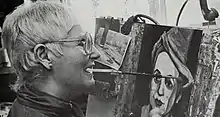Harriet Bell
Harriet Bell (July 14, 1923 – September 10, 1995)[1] was an American advocate for disability rights. She was a co-founder and director of the Polio Information Center and a member of the New York State Board for Nursing. Residing in the Goldwater Memorial Hospital after contracting polio, she was president of the hospital board for four terms, participating in drafting the Patient’s Bill of Rights. In 1982, she was the recipient of the Wonder Woman Foundation Award of Warner Communications Inc. as an agent of change.
Harriet Bell | |
|---|---|
 | |
| Born | July 14, 1923 New York |
| Died | September 10, 1995 (aged 72) Roosevelt Island, New York |
| Nationality | American |
| Occupation | disability rights advocate |
| Years active | 1953–1995 |
Early life
Bell grew up in Buffalo, New York and had one sister and a step-sister. In 1931, her sister contracted polio and in 1949, her stepsister contracted the disease as well.[2] After working as a model, she married and had three children, Cathie (born 1950) and twins Douglas and Lori (born 1953).[3] In 1954, she contracted polio, seven months prior to the availability of the polio vaccine. She was admitted to the Goldwater Memorial Hospital and confined to an iron lung. After experiencing anger and depression, and offering to allow her husband a divorce, Bell determined to take control of her life. Her husband refused to accept a divorce and though they lived separately, the couple parented their children together.[4] As her health improved, she gained mobility with use of a wheelchair and was able to attend family functions, though her need for mechanical respiratory assistance made it necessary for her to live at the hospital facility for twenty-five years.[5][6] During her tenure in residence, she was president of the hospital board for four terms, participating in drafting the Patient’s Bill of Rights.[7]
Career
Wishing to further her education, Bell tried to enroll in numerous universities in the New York City area but was rejected because of her disabilities. In 1977, she was accepted at Empire State College through an extension program that allowed distance education and graduated in 1979. Soon after her graduation, she moved out of the hospital, taking a nearby apartment.[8] Bell and Florence Weiner co-founded the Polio Information Center, an international data base on the disease. Bell became editor and publisher of the newsletter for the center, which she operated from her residence.[6][9] She was nominated and won the Wonder Woman Foundation Award of Warner Communications Inc. in 1982, for her ability to create a new reality from her circumstance.[10] In 1984, she completed her PhD studies at Columbia Pacific University with a dissertation, Polio Survivors: Their Quality of Life.[11] Despite being a quadriplegic, Bell developed skill as a painter and a typist, using assistive technology.[12]
Death and legacy
Bell died on September 10, 1995 at her home on Roosevelt Island.[6] The information provided by the center she co-founded was an early resource for post-polio syndrome, little known at that time,[13][14] and became an internationally recognized reference base.[6]
References
Citations
- Social Security Death Index 1995.
- Weiner 1986, p. 35.
- The Arizona Republic 1955, p. 11.
- Weiner 1986, p. 36.
- Weiner 1986, pp. 36–37.
- The New York Times 1995.
- Weiner 1986, p. x.
- Bonnabeau 1996, p. 85.
- Kenny 1986, p. 120.
- McCormack 1982.
- Bell 1984.
- Weiner 1986, pp. 35, 94, 139.
- Brown 1986, p. 19.
- Central Virginia Post Polio Support Group n.d., p. 2.
Bibliography
- Bell, Harriet E. (January 1984). Polio Survivors: Their Quality of Life (PDF) (PhD). San Rafael, California: Columbia Pacific University. Archived from the original (PDF) on 10 October 2017.CS1 maint: ref=harv (link)
- Bonnabeau, Richard Francis (1996). The Promise Continues: Empire State College : the First Twenty-five Years. Virginia Beach, Virginia: Donning Company. ISBN 978-0-89865-966-5.CS1 maint: ref=harv (link)
- Brown, George W. (August 28, 1986). "Post-polio syndrome little known". The Asbury Park Press. Asbury Park, New Jersey. p. 19. Retrieved 10 October 2017 – via Newspapers.com.CS1 maint: ref=harv (link)

- Kenny, Karen (September 24, 1986). "Willing and Able". The Chicago Tribune. Chicago, Illinois. Los Angeles Daily News. p. 120. Retrieved 10 October 2017 – via Newspapers.com.CS1 maint: ref=harv (link)

- McCormack, Patricia (December 3, 1982). "Wonder Woman Foundation honors women's achievements". Miami, Florida. United Press International. Archived from the original on 5 October 2017. Retrieved 10 October 2017.CS1 maint: ref=harv (link)
- Weiner, Florence (1986). No apologies (1st ed.). New York, New York: St. Martin's Press. ISBN 0-312-57523-8.CS1 maint: ref=harv (link)
- "Harriet Bell, Rights Advocate, 72". The New York Times. New York City, New York. September 17, 1995. Archived from the original on 26 May 2015. Retrieved 10 October 2017.
- "Keep Smiling". The Arizona Republic. Phoenix, Arizona. January 13, 1955. p. 11. Retrieved 10 October 2017 – via Newspapers.com.

- PPS and the Central Virginia Post-Polio Support Group (PDF) (Report). Richmond, Virginia: Central Virginia Post Polio Support Group. n.d. Archived from the original (PDF) on 10 October 2017. Retrieved 10 October 2017.
- "United States Social Security Death Index: Harriet E Bell". FamilySearch. Alexandria, Virginia: U.S. Social Security Administration, National Technical Information Service. 10 September 1995. Retrieved 10 October 2017.